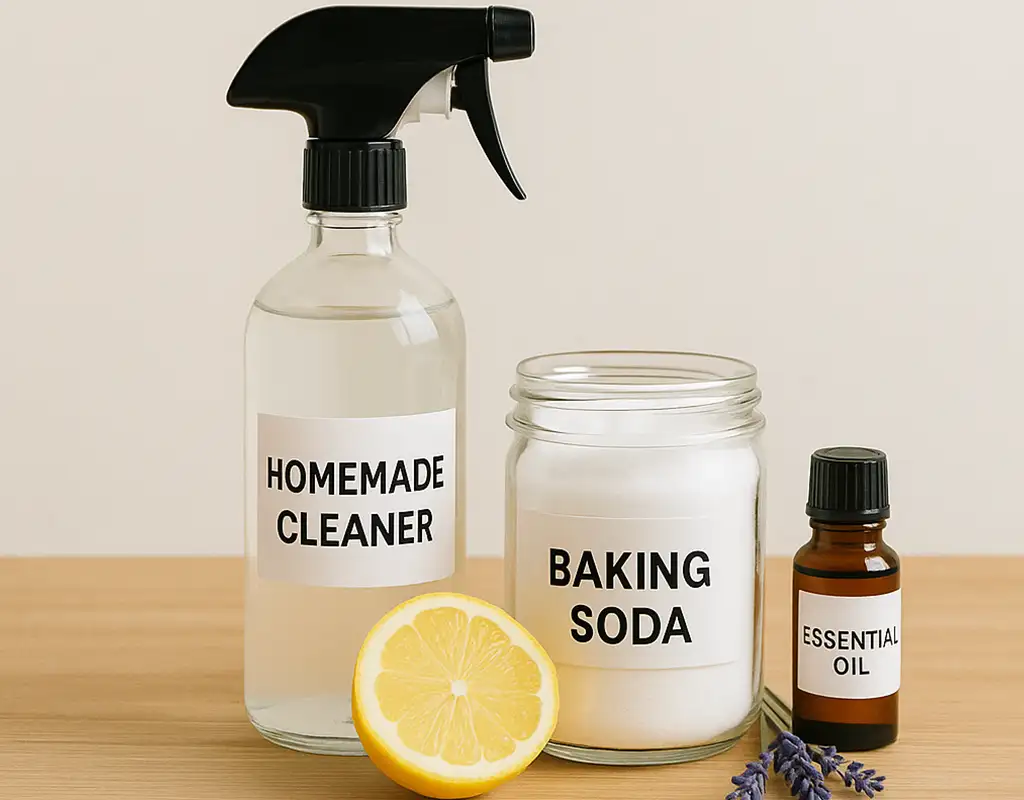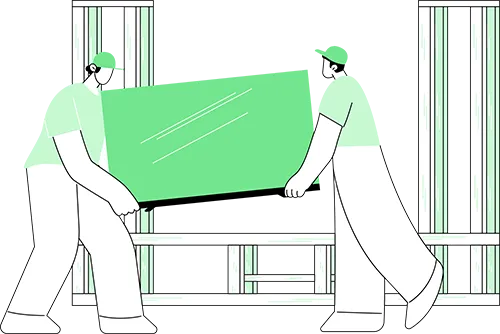🕓 Last updated: September 14, 2025
Why Choose a Homemade House Cleaner?
Before diving into recipes, it’s important to understand why homemade house cleaners are gaining popularity. Unlike store-bought products, DIY cleaners offer:
- Non-toxic ingredients that are safe for children and pets.
- Customizability depending on your preferences or sensitivities.
- Cost-effectiveness using ingredients already in your pantry.
- Environmental friendliness by reducing plastic waste and toxic runoff.
These benefits make homemade cleaners an ideal choice for health-conscious and eco-aware households.
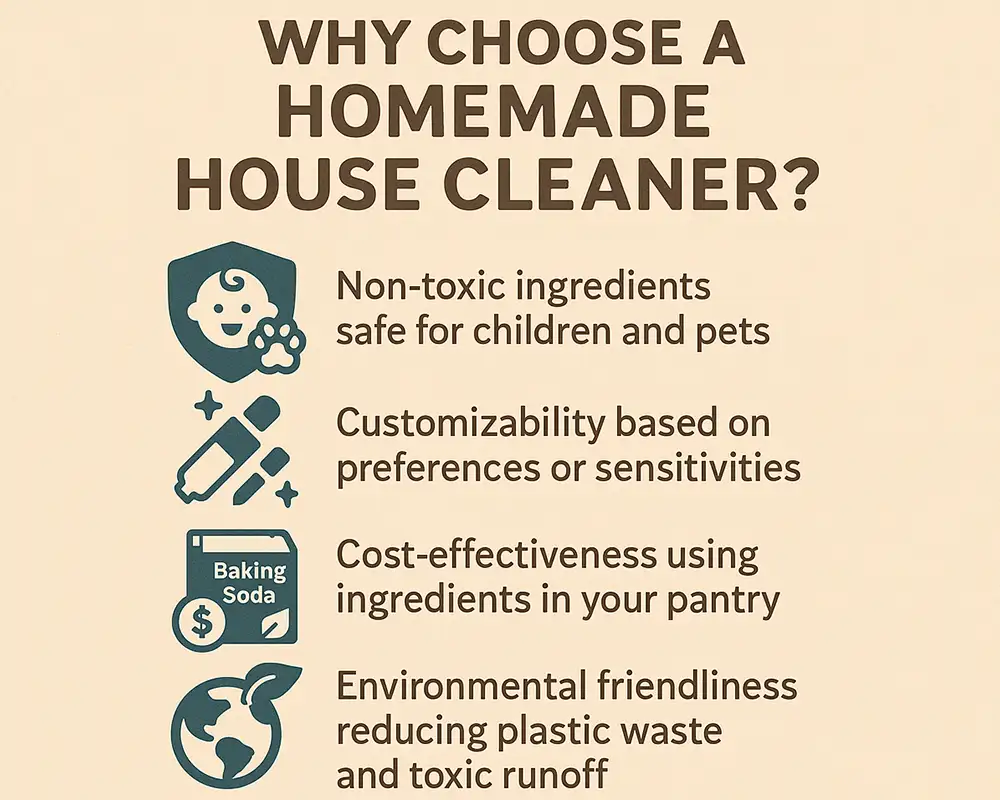
Key Ingredients in the Best DIY Cleaners
The foundation of any effective homemade house cleaner lies in a few essential ingredients. These natural components are versatile, easy to find, and safe:
- White Vinegar – Cuts through grease, deodorizes, and disinfects.
- Baking Soda – Gently scrubs, neutralizes odors, and lifts stains.
- Castile Soap – A plant-based, biodegradable soap that dissolves dirt.
- Lemon Juice – A natural bleaching agent with a fresh scent.
- Hydrogen Peroxide – Disinfects and brightens surfaces.
- Essential Oils – Add pleasant aroma and antimicrobial properties.
By combining these ingredients thoughtfully, you can create multi-purpose cleaners for every corner of your home.
All-Purpose Cleaner for Everyday Use
An all-purpose cleaner is the cornerstone of any homemade cleaning routine. It should be gentle enough for frequent use but tough enough to handle daily grime.
Recipe:
- 1 cup white vinegar
- 1 cup water
- 10 drops lemon or lavender essential oil
- Optional: 1 teaspoon Castile soap for added cleaning power
Instructions:
Mix all ingredients in a spray bottle. Shake before each use. Perfect for wiping down counters, appliances, doorknobs, and more.
Why it works:
The vinegar breaks down grease and eliminates bacteria, while essential oils leave a clean, fresh scent.
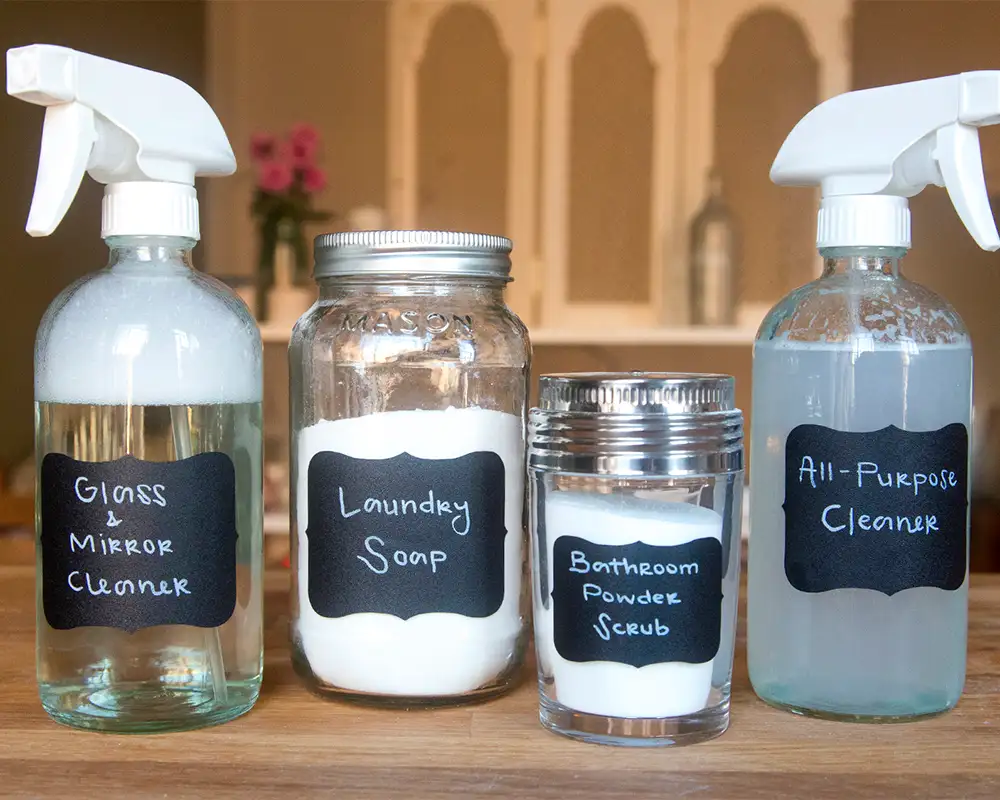
Best Homemade Glass and Mirror Cleaner
For streak-free glass and mirrors, a specialized cleaner is essential. Vinegar and alcohol team up to remove smudges without residue.
Recipe:
- 1/2 cup white vinegar
- 1/2 cup rubbing alcohol
- 1 tablespoon cornstarch (optional – adds extra shine)
- 1 cup water
Instructions:
Combine in a spray bottle and shake well. Spray on glass surfaces and wipe with a microfiber cloth.
Pro tip: Always shake before use to keep cornstarch mixed in for best results.
Natural Bathroom Cleaner for Tough Stains
Bathrooms demand heavy-duty cleaners that can tackle soap scum, mildew, and bacteria—without releasing harsh fumes.
Recipe:
- 1/2 cup baking soda
- 1/4 cup hydrogen peroxide
- 1 teaspoon Castile soap
Instructions:
Apply the paste to tubs, tiles, and sinks. Let it sit for 5–10 minutes, then scrub with a brush or sponge and rinse.
Why it works:
Baking soda acts as a gentle abrasive, while hydrogen peroxide disinfects and whitens.
Best Homemade Kitchen Degreaser
Grease buildup in the kitchen can be tricky. You need a solution that cuts through it without damaging surfaces.
Recipe:
- 1 cup warm water
- 1 tablespoon baking soda
- 1 tablespoon Castile soap
- 10 drops orange essential oil
Instructions:
Spray on greasy surfaces like stovetops or range hoods. Let sit for a few minutes before wiping away.
Orange oil not only adds fragrance but also breaks down grease molecules naturally.
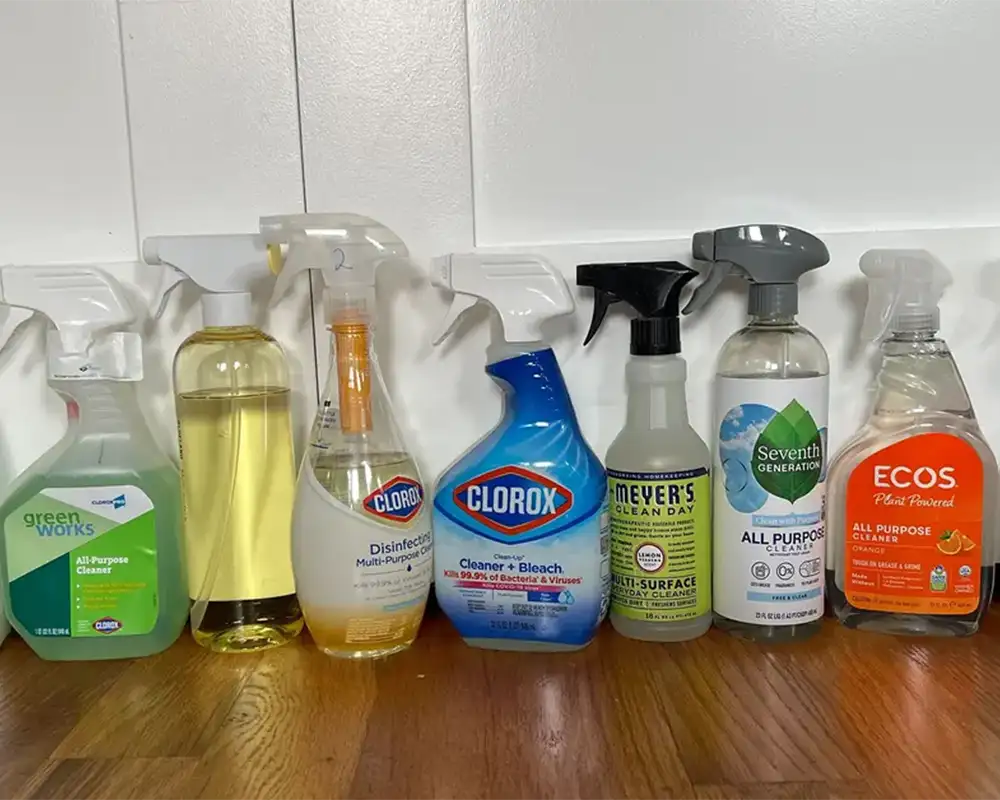
DIY Floor Cleaner (Safe for All Types)
Whether you have hardwood, tile, or vinyl, this floor cleaner gets the job done without leaving behind sticky residue.
Recipe:
- 1/2 cup white vinegar
- 1 gallon warm water
- 10 drops peppermint or eucalyptus essential oil
Instructions:
Mix in a bucket and mop as usual. No rinsing required. Not recommended for unsealed wood floors.
Natural Disinfectant Spray
In today’s world, disinfecting is more important than ever. Fortunately, you can create a powerful disinfectant at home.
Recipe:
- 1 cup 3% hydrogen peroxide
- 1 cup distilled water
- 15 drops tea tree oil or eucalyptus oil
Instructions:
Spray on surfaces and let air dry for full disinfecting power. Do not mix with vinegar or store in sunlight.
Best Homemade Air Freshener Spray
Don’t just cover up odors—eliminate them naturally with this homemade air freshener.
Recipe:
- 1 cup water
- 2 tablespoons vodka (helps disperse oils)
- 15–20 drops essential oil (e.g., lavender, citrus, or cinnamon)
Instructions:
Combine in a spray bottle and spritz into the air or onto fabric surfaces for an instant refresh.
DIY Carpet and Upholstery Deodorizer
Carpets and couches can trap odors. Freshen them up with a simple dry sprinkle.
Recipe:
- 1 cup baking soda
- 10 drops lavender or rosemary oil
Instructions:
Mix and sprinkle over carpets or fabric furniture. Let sit for 15 minutes, then vacuum thoroughly.
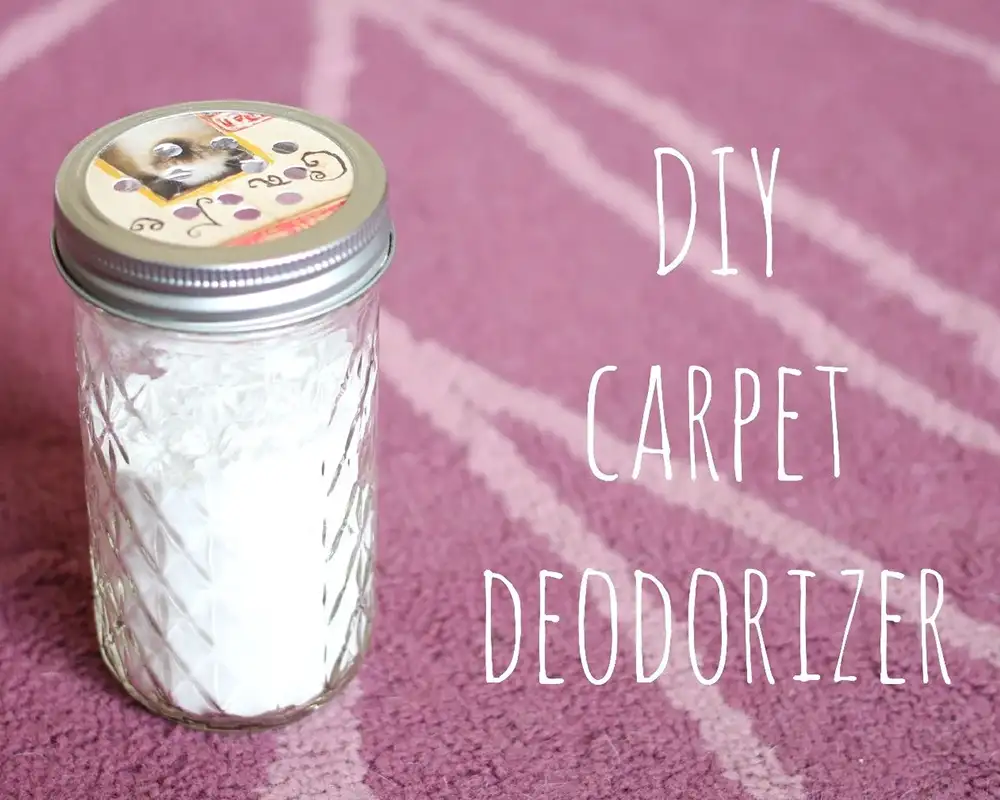
How to Store Homemade Cleaners
Even natural products need proper storage to maintain their effectiveness. Here are a few tips:
- Use glass spray bottles for acidic recipes (like those with vinegar).
- Label each bottle clearly with the recipe and date.
- Store in a cool, dark place, away from direct sunlight or heat.
- Shake before use, especially those containing oils or cornstarch.
Are Homemade Cleaners Truly Effective?
Yes—when made correctly, homemade cleaners can be just as effective as store-bought versions. The key is using proven natural ingredients and tailoring your cleaner to the specific task (e.g., degreasing vs. disinfecting). For regular home maintenance, DIY cleaners are more than enough.
However, for extreme cases (e.g., black mold), stronger specialized products may still be necessary.
Safety Tips When Using Homemade Cleaners
Even natural ingredients can be harmful when used incorrectly. Keep these tips in mind:
- Never mix vinegar and bleach—it releases toxic chlorine gas.
- Avoid combining hydrogen peroxide and vinegar in the same container.
- Test any new cleaner on a small surface area before full use.
- Keep cleaners out of reach of children and pets.
Can Homemade Cleaners Save Money?
Absolutely! Most DIY recipes cost a fraction of store-bought cleaners. For example, a bottle of vinegar and a box of baking soda can replace five or six different commercial products.
Plus, with multi-use ingredients, you’re cutting down on plastic packaging, trips to the store, and unnecessary expenses.
Best Essential Oils for Cleaning
Essential oils not only smell amazing—they can help clean too. Here are the most effective ones:
- Tea Tree Oil – Antifungal, antibacterial, and antiviral.
- Lemon Oil – Degreases and deodorizes.
- Lavender Oil – Soothes and disinfects.
- Eucalyptus Oil – Fights bacteria and adds a refreshing scent.
- Peppermint Oil – Insect-repelling and energizing.
When used properly, these oils can turn your cleaner into an aromatherapy session.
Eco-Friendly Cleaning: A Lifestyle Shift
Using homemade cleaners isn’t just about scrubbing surfaces—it’s about embracing a more conscious lifestyle. By going DIY, you reduce your carbon footprint, lower exposure to synthetic chemicals, and take control of what’s in your home.
It’s a small shift with a big impact, both for your health and for the planet.
Final Verdict: The Best Homemade House Cleaner
So, what is the best homemade house cleaner? There’s no single “one-size-fits-all” answer—because the best cleaner depends on your needs. That said, a vinegar-based all-purpose spray with essential oils stands out as the most versatile, safe, and effective option.
For specialized tasks, like bathrooms or grease removal, tailor your recipe accordingly. But for everyday cleaning? Stick with the simple vinegar-water formula and customize the scent to your liking.

